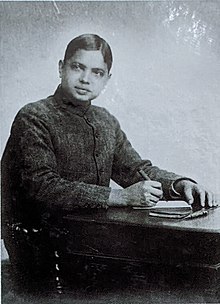Devdas Gandhi
This article needs additional citations for verification. (March 2020) |
Devdas Gandhi | |
|---|---|
 Devdas Gandhi in 1931 | |
| Born | Devdas Mohandas Gandhi 22 May 1900 |
| Died | 3 August 1957 (aged 57) |
| Nationality | Indian |
| Spouse | Lakshmi Chakravarti[1][2] |
| Children | 4, including Rajmohan, Ramchandra, and Gopalkrishna |
| Parents | |
| Relatives |
|
Devdas Mohandas Gandhi (22 May 1900 – 3 August 1957) was the fourth and youngest son of Mahatma Gandhi. He was born in the Colony of Natal and came to India with his parents as a grown man. He became active in his father's movement, spending many terms in jail. He also became a prominent journalist, serving as editor of Hindustan Times. He was also the first pracharak of the Dakshina Bharat Hindi Prachar Sabha (DBHPS), established by Mohandas Gandhi in Tamil Nadu in 1918. The purpose of the Sabha was to propagate Hindi in southern India.[3]
Family
[edit]Devdas fell in love with Lakshmi, the daughter of C. Rajagopalachari, Devdas's father's associate in the Indian independence struggle. Due to Lakshmi's age at that time – she was only 15 and Devdas was 28 – both Devdas's father and Rajaji asked the couple to wait for five years without seeing each other. After five years had passed, they were married with their fathers' permissions in 1933.[4]
Devdas and Lakshmi had four children including Rajmohan Gandhi, Gopalkrishna Gandhi and Ramchandra Gandhi.[5]
Legacy
[edit]When Mahatma Gandhi started seeking help for establishment of Jamia Millia Islamia, Devdas also came forward on the call of Gandhi. He started teaching Hindi there and also cotton spinning.[6]
References
[edit]- ^ Hopley, Antony R. H. (2004). "Chakravarti Rajagopalachari". Oxford Dictionary of National Biography (online ed.). Oxford University Press. doi:10.1093/ref:odnb/31579. (Subscription or UK public library membership required.)
- ^ Varma et al., p 52
- ^ "When Gandhi turned half-naked fakir in Tamil Nadu". Outlook India. Retrieved 11 March 2020.
- ^ Tunzelmann, Alex Von (2008). Indian Summer: The Secret History of the End of an Empire. London, United Kingdom: Simon & Schuster. p. 78. ISBN 9781416522256.
- ^ Ramachandra Guha (15 August 2009). "The Rise and Fall of the Bilingual Intellectual" (PDF). Economic and Political Weekly. XLIV (33). Economic and Political Weekly.
- ^ "Jamia Millia and Mahatma Gandhi: A Walk into History Lanes". inclusiveindia.net. 23 October 2020. Archived from the original on 12 September 2021. Retrieved 12 September 2021.
Devdas is teaching cotton spinning etc at Jamia Millia
